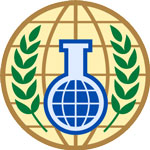International Day for the Foundation of the Organization for the Prohibition of Chemical Weapons Date in the current year: April 29, 2026
 The International Day for the Foundation of the Organization for the Prohibition of Chemical Weapons, formerly known as the Day of Remembrance for All Victims of Chemical Warfare, is observed annually on April 29.
The International Day for the Foundation of the Organization for the Prohibition of Chemical Weapons, formerly known as the Day of Remembrance for All Victims of Chemical Warfare, is observed annually on April 29.The Organization for the Prohibition of Chemical Weapons (OPCW) was created to implement the Chemical Weapons Convention and in the long run achieve the permanent and verifiable destruction of chemical weapons.
Developed in 1992 by the Conference on Disarmament, the Chemical Weapons Convention augments the Geneva Protocol of 1925, which prohibits the use of chemical and biological weapons in international armed conflicts. It was approved by the UN General Assembly on November 30, 1992 and entered into force on April 29, 1997.
To oversee the implementation of the Chemical Weapons Convention, the OPCW was created. It was formally established the day the convention entered into force, but the OPCW headquarters were officially opened over a year later, on May 20, 1988. The OPCW is based in the Hague and has a laboratory facility and equipment store in Rijswijk.
The OPCW has 193 member states, which are parties to the Chemical Weapons Convention. Four UN members are not party to the Convention: Israel has signed but not ratified the Convention, and Egypt, North Korea and South Sudan have not acceded to it despite being eligible to join. In addition, Syria was stripped of its voting rights in 2021, after its forces were found to have used chemical warfare during the civil war.
The main body of the OPCW is the Conference of the States Parties. Its executive organ is the Executive Council, consisting of 41 state parties appointed for a term of two years. Most activities mandated by the council are applied by the Technical Secretariat.
The OPCW has the power to inspect all operational chemical weapons destruction facilities and industrial facilities of member states that produce scheduled chemicals, as well as to undertake inspections in case of alleged use of chemical weapons.
In 2013, the OPCW was awarded the Nobel Peace Prize for its work in destroying chemical weapons. In 2014, the organization established the OPCW—The Hague Award to recognize and honor institutions and individuals for their significant contribution to the elimination of chemical weapons. Past winners include Dr. Mahdi Balali-Mood, Dr. Alastair Hay, Dr. Robert Mathews, Robert Mikulak, Cheng Tang, the African Center for the Study and Research on Terrorism, the International Master Courses in Protection Against CBRNe Events, the International Union of Pure and Applied Chemistry, and the VERIFIN.
In 2005, the United Nations General Assembly declared the foundation anniversary of the OPCW as the Day of Remembrance for All Victims of Chemical Warfare to reaffirm the organization’s commitment to the elimination of chemical weapons.
In 2015, the observance was moved to November 30 (the anniversary of the approval of the Chemical Weapons Convention), and the OPCW designated April 29 the International Day for the Foundation of the Organization for the Prohibition of Chemical Weapons (OPCW Day) instead.
- Category
- International Observances
- Tags
- International Day for the Foundation of the Organization for the Prohibition of Chemical Weapons, OPCW Day, international observances